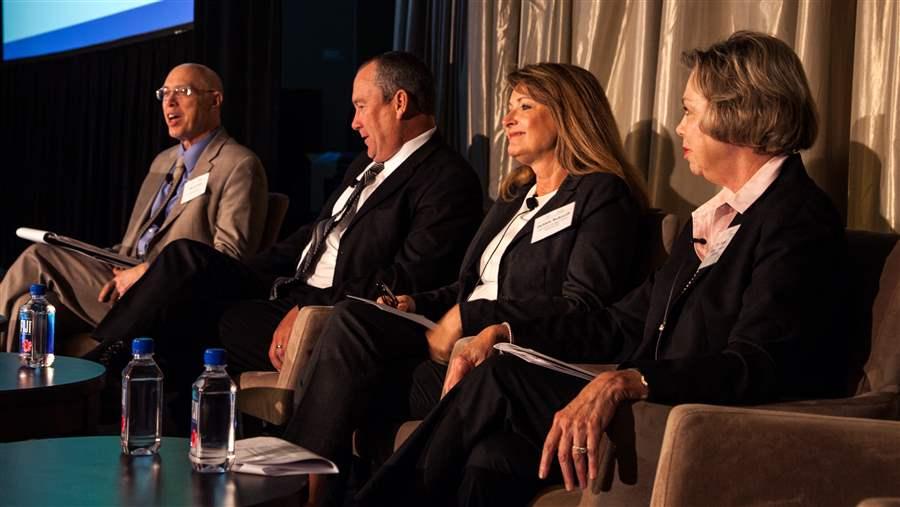Pew-MacArthur Results First Draws State Delegations to D.C.
 The Pew Charitable Trusts
The Pew Charitable TrustsPanelists at the Pew-MacArthur Results First State Convening 2015.
The Pew-MacArthur Results First Initiative hosted its annual State Convening on Aug. 19–20, 2015, in Washington. With delegations from 18 states present, this event provided an opportunity for Results First partners to reflect on progress made thus far, hear about new resources and tools, and learn from each other’s success.
Speakers from partner states shared their experiences in implementing the Results First program and influencing change in their agencies and state capitols. Keynote speaker Ron Haskins, senior fellow at the Brookings Institution, offered his perspective on the role of evidence-based policymaking at the federal level.
Key takeaways:
- The culture of evidence is growing.
As states continue to face tough budget choices and policymakers must allocate limited taxpayer dollars among competing demands, knowing which programs provide the greatest return on investment becomes increasingly crucial. As Haskins said in his remarks, the federal government, foundations, interest groups, and others are taking note of the power of evidence-based policymaking as a means of ensuring that limited dollars are spent wisely. In recent years, the federal government has established several programs that require grant recipients to use rigorous evidence. State governments are also paying increasing attention to evidence, with 19 states joining the Pew-MacArthur Results First Initiative, including Alaska, Delaware, and Minnesota, which joined this year. - A new year brings new tools.
Among the highlights of the conference was the unveiling of the new cloud-based Results First model. The model offers a more efficient tool, with enhanced features and functionalities for state partners. Sessions also previewed soon-to-be-released resources, including user guides and program summaries for state partners.
The convening included discussions on potential new policy areas for the Results First model. Along with the current issue areas—criminal justice, child welfare, education, prevention, mental health, and substance abuse—the Pew-MacArthur Results First Initiative team is looking into health care and the workforce as fields that could benefit from an evidence-based approach.
- Communication is a key component of progress.
The importance of effectively communicating to legislators, partners, colleagues, and other stakeholders was a theme that permeated the event. Results First partners face the challenge of not only making an argument for evidence-based policymaking but also describing how the Results First model is implemented and how it can support policy and budget changes in their specific states. Speakers shared stories, advice, and examples of reports, briefs, and other visual aids that helped them in their communities.
The Pew-MacArthur Results First Initiative, a project of The Pew Charitable Trusts and the John D. and Catherine T. MacArthur Foundation, works with states to implement an innovative cost-benefit analysis approach that helps them invest in policies and programs that are proved to work. More information about the project can be found on the website.







